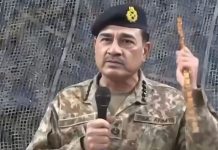Aurangzeb says measures were being also taken to block the loopholes in Sales Tax system with a complete digitization adding sufficient data was available, indicating potential tax evaders. However, he added, the data would be thoroughly verified by a data analyst team
Ansar M Bhatti
ISLAMABAD,): Finance Minister Senator Muhammad Aurangzeb said on Thursday that the elite class of the country has to be properly taxed in order to not only broaden the tax net but to ensure even-handed treatment to all.
He expressed these views while speaking in the post budget media interaction. The Finance Minister, Chairman FBR and the state minister were flooded with the questions relating to agriculture tax and taxes on the rich class of Pakistan.
The finance minister and the Chairman FBR had no clear answer when a journalist asked about action against those exposed in the Dubai leaks. The FBR chairman even did not deny the charge that certain powerful quarters had approached the FBR chairman and asked him to keep a mum about the Dubai leaks.
Finance Minister Senator Muhammad Aurangzeb further said that the government was determined to plug the tax leakages and has initiated end-to-end digitization of the revenue collection system to minimize human intervention; end harassment and improve tax compliance culture in the country.
He said measures were being also taken to block the loopholes in Sales Tax system with a complete digitization adding sufficient data was available, indicating potential tax evaders. However, he added, the data would be thoroughly verified by a data analyst team.
He said that the verified data would be provided to the field formation for execution and bring tax evaders into the tax net. He said negotiations with the provincial government were also in progress to enhance revenue collection and rationalization of expenditures.
Elaborating rationalizing measures, the minister said in the first phase, devolved ministries would be closed as some, such as PWD had already been closed. He said measures were afoot to shut down other ministries/departments during a couple of months.
Regarding the privatization programme of the current government, the minister categorically cleared that all the stakeholders were on-board and the government was taking the process forward in consultation with the allied political parties to complete it within the stipulated time-frame.
He said that the privatization of loss-making entities was essential for the economic recovery and social development of the country, adding the privatization of Pakistan International Airlines would be completed by 15 August and after its divestment, under the direction of Prime Minister, work on the outsourcing of Islamabad Airport would be initiated.
Soon after that other airports including Lahore and Karachi would also be outsourced, he said adding the government was also keen to introduce corporate governance in the power distribution companies (Discos) to enhance their efficiency by deputing the their chairmen from the private sector experts.
To a question, the minister said that the talks with the International Monetary Fund (IMF) were held in a cordial manner and were progressing towards a positive direction to reach a conclusion by next month.
Speaking on the occasion, Minister of the State for Finance and Power, Ali Pervaiz Malik said that the government was aware of the hardships faced by the common man in the country and it was working on broad-based reforms agenda to enhance efficiencies of public sector organizations to create fiscal space for them.
He said that despite fiscal constraints, the government had enhanced the budgetary allocation of the Benazir Income Support Programme and subsidy for the power sector for the safety of protected consumers, adding that minimum wage was increased.
Chairman Federal Board of Revenue clarified that there was no increase in the tax on DAP fertilizer, adding that tax on imported tractors were enhanced by 10 percent as the locally manufactured tractors were levied about 18 percent tax and the imposition of tax on the imported tractors were aimed at making the product competitive in local market.

















